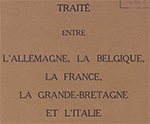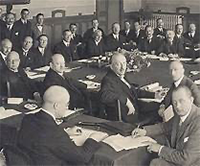The Locarno Treaties
The Locarno Treaties were a series of seven agreements between European powers that settled significant border issues after the end of World War I. The name comes from the Swiss town in which the treaties were negotiated, in October 1925. 
As part of the Treaty of Versailles, Germany had reluctantly agreed to pay a huge sum of reparations to its Great War enemies. The amount to pay crippled the German postwar economy, and the government in 1923 defaulted. In response, Belgian and French troops occupied the Ruhr, an area of Germany rich in mining and manufacturing. Germany won some help in paying off its reparation debt in the form of the Dawes Plan, a scheme that saw American bankers loan Germany money in exchange for taking over the mortgage of the German National Bank, the German national railways, and many other German industries. Gustav Stresemann, the German foreign minister proposed a meeting of high-ranking officials from European nations involved in the war, to hammer out details still causing disagreement. The result was nearly a month of meetings, which ended with the crafting of seven treaties. Attending were the following:

The first treaty, known as the Rhineland Pact, stabilized the borders between Belgium, France, and Germany. Two other nations, Italy and the United Kingdom, were to act as a "police force," agreeing to invade if any of those three nations violated the agreed-on borders. Subsequent treaties involved arbitration as a solution for future disagreements between Belgium and Germany, between Germany and France, between Germany and Poland, and between Czechoslovakia and Germany. In addition, France signed treaties guaranteeing mutual assistance with Czechoslovakia and Poland. As well, the Rhineland became a demilitarized zone. Negotiations took place in Locarno, Italy, October 5–16, 1925. Representatives of all nations signed the treaties on December 1, in London. The agreements contributed to a greater feeling of peace throughout Europe. Germany's participation helped convince its neighbors to approve its admission to the League of Nations in 1926. |
|
Social Studies for Kids
copyright 2002–2026
David White




